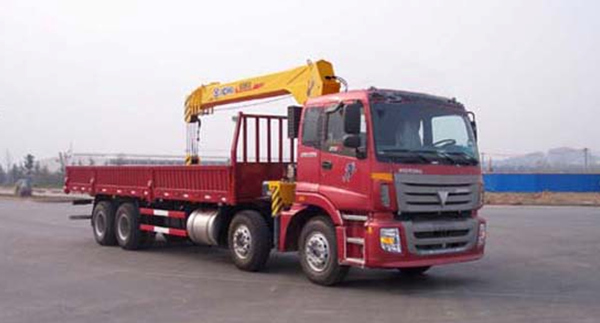The maintenance of a crane is still very simple, but it is also very detailed. Many consumers pay special attention to their quality when purchasing ten tons of truck cranes. It is irrelevant whether to buy a better quality crane or even if the price is higher. However, if there is no certification operation for daily use, or if there are some serious faults, even if the quality of the vehicle is better, it will not be possible to have a long service life. Therefore, we must know how to maintain the truck crane daily.

Hydraulic system testing. Normally using ten tons of truck cranes, we are also required to check the state of the hydraulic system to see whether there are serious wear or deformation problems in the parts. It is best to replace parts in time. Of course, we also need someone to test it. If the hydraulic system is really a problem, it can be solved without replacing the parts. We must find a professional after-sales service staff to ensure that the vehicle continues to operate.
Do a daily inspection to the annual inspection. The daily inspection is still very simple and simple. Ten tons of truck cranes are only required to check for cleanliness. Any unusual conditions can be generated. Abnormal sounds are also checked daily. Weekly inspections and monthly inspections can best be handled by someone else. We must pay special attention to whether the clutch or the brake device fails. The annual inspection must find a professional department to jointly conduct inspections. If a failure occurs, it must be repaired in time to ensure that it will not affect the work.
Studies have shown that if the daily maintenance is proper, the service life of a ten-ton vehicle crane can be extended by several years to more than ten years, and it can also ensure a good practicality. It is best to be able to use professional lubricants, and to perform comprehensive tests on parts at regular intervals, so as to ensure that the vehicle does not experience other failures. As long as we can ensure the quality of vehicles and daily maintenance, we can effectively protect our rights and interests.
TITANIUM HEAT EXCHANGERS
In chemical processes, the use of Titanium Heat Exchangers has been found to be a cost-effective method of resisting leaks from corrosion on a process line. The following information provides additional background on Titanium, its characteristics, strengths, and how a Titanium Heat Exchanger could be the answer to corrosion in your system.
Life Cycle Benefits of Titanium Heat Exchangers
Titanium Heat Exchangers are highly cost-effective over the entire life cycle of the equipment. Properly maintained, Titanium Heat Exchangers can operate for decades, making them a very economical choice.
Titanium Heat Exchangers can:
Provide an extended service life compared to other materials of construction
Eliminate expensive downtime due to equipment failure
Do away with requirement for spare parts inventory
Provide superior corrosion resistance
Deliver high heat transfer efficiency
Accommodate high steam pressure to reduce required surface area
Eliminate breakage during handling, installation and operation due to fully-welded metal construction
Titanium the Metal
Titanium is one of several metals which fall into the category of reactive metals or corrosion resistant alloys (CRAs). Reducing or oxidizing environments, with or without chlorides, and temperatures up to 1200°F, are all possible with this group of exceptional materials. In addition to high resistance to uniform corrosion attack, CRAs can be very successful against pitting, crevice and stress corrosion.
Titanium is used as the material of construction for Heat Exchangers in chemical, petrochemical, oil & gas and other industrial manufacturing environments. In these processes, aggressive fluids, often at very high temperature and or pressure, come into contact with equipment surfaces, testing the strength and corrosion resistance of the material.
Considered the workhorse of the reactive metals, Titanium is readily available. More Titanium goes into corrosion-resistant equipment fabrication than all other reactive metals combined. Please see Applications of Titanium for a more in depth look at additional uses for Titanium that includes some comparative corrosion resistance data, media, concentrations and temperatures.
Titanium Heat Exchanger Designs
TITAN offers a full range of TEMA-type Titanium Heat Exchangers. Utilizing both HTRI and AspenTech thermal design software, we can custom design a Heat Exchanger to fit your application. TITAN`s Heat Exchanger designs take advantage of loose-lined, solid, and explosive clad tube sheet options based on the mechanical demands of the application.
TITAN manufactures pressure equipment in accordance with all major international design standards and pressure vessel codes.
Titanium Corrosion Resistance
TITAN Titanium Heat Exchangers are used in a wide variety of environments. To view a list of materials where Titanium is commonly used, please visit Applications of Titanium.
Titanium Fabrications
In addition to Titanium Heat Exchangers, TITAN regularly designs, engineers and fabricates the following types of Titanium custom process equipment:
Titanium Columns and Towers
Titanium Pressure Vessels
Titanium Reactors
Titanium Spargers
Titanium Pipe
Titanium Piping Systems
Titanium Heat Exchanger,Titanium Plate Heat Exchanger,Exchanger Titanium Aquarium,Titanium Tube Heat Exchanger
Liaoning LotusNine International Trade co.,ltd , https://www.lj-heatexchangers.com